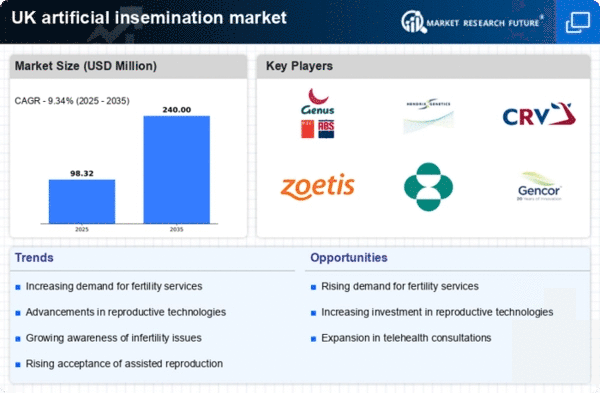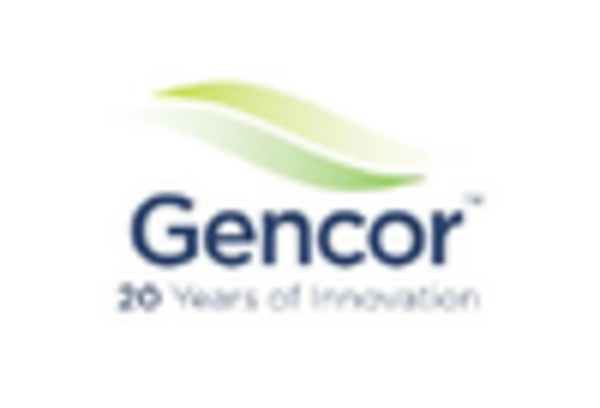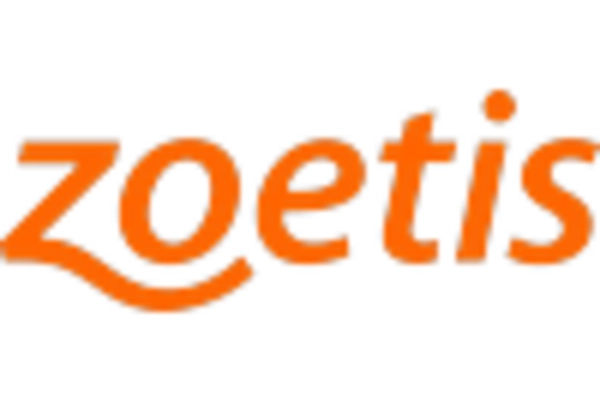Cultural Shifts Towards Family Planning
Cultural shifts in attitudes towards family planning are significantly impacting the artificial insemination market. In the UK, there is a growing trend of individuals prioritizing career and personal development before starting a family. This shift has led to an increase in the number of people seeking artificial insemination as a means to achieve their reproductive goals later in life. Additionally, changing societal norms regarding single parenthood and same-sex couples seeking to start families have further expanded the market. As these cultural dynamics evolve, the artificial insemination market is likely to adapt and grow, catering to a more diverse range of family structures.
Advancements in Reproductive Technologies
Technological innovations play a crucial role in shaping the artificial insemination market. Recent advancements in reproductive technologies, such as improved sperm selection techniques and enhanced cryopreservation methods, have significantly increased the success rates of artificial insemination procedures. For instance, the introduction of preimplantation genetic testing has enabled better selection of embryos, thereby improving outcomes for patients. The market is also benefiting from the integration of artificial intelligence in fertility treatments, which optimizes the timing of insemination and enhances overall efficiency. As these technologies continue to evolve, they are likely to attract more patients, further driving the growth of the artificial insemination market.
Increasing Demand for Fertility Treatments
The rising demand for fertility treatments in the UK is a primary driver of the artificial insemination market. Factors such as delayed parenthood, lifestyle changes, and increased awareness of reproductive health contribute to this trend. According to recent statistics, approximately 1 in 7 couples experience difficulties conceiving, leading to a growing reliance on assisted reproductive technologies. The artificial insemination market is witnessing a surge in patients seeking these services, with a notable increase in the number of clinics offering specialized treatments. This heightened demand is expected to propel market growth, as more individuals and couples turn to artificial insemination as a viable solution to infertility challenges.
Government Support and Funding for Fertility Treatments
Government initiatives and funding for fertility treatments are pivotal in influencing the artificial insemination market. The UK government has implemented various policies aimed at improving access to fertility services, including funding for IVF and artificial insemination procedures through the National Health Service (NHS). This support not only alleviates the financial burden on patients but also encourages more individuals to seek treatment. As a result, the artificial insemination market is likely to experience growth driven by increased accessibility and affordability of services, fostering a more supportive environment for those facing fertility challenges.
Rising Awareness and Acceptance of Assisted Reproductive Technologies
The growing awareness and acceptance of assisted reproductive technologies among the UK population is a significant driver for the artificial insemination market. Public campaigns and educational initiatives have played a vital role in demystifying fertility treatments, leading to increased acceptance of artificial insemination as a legitimate option for family planning. Surveys indicate that a substantial % of the population now views these technologies positively, contributing to a more informed patient base. This shift in perception is likely to result in higher demand for artificial insemination services, as individuals and couples become more willing to explore these options to achieve their reproductive goals.
















